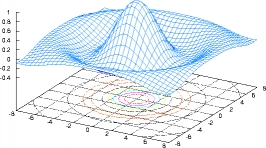Octave
A 3D plot of a two-dimensional sinc function of radius (sombrero).
Developer: John W. Eaton
License: GNU GPLv2
Web: http://www.octave.org/
Features
Octave has extensive tools for solving common numerical linear algebra problems, finding the roots of nonlinear equations, integrating ordinary functions, manipulating polynomials, and integrating ordinary differential and differential-algebraic equations. It is easily extensible and customizable via user-defined functions written in Octave's own language, or using dynamically loaded modules written in C++, C, Fortran, or other languages.
Octave packages
Octave binary packages are provided from OSS repository of all actual openSUSE versions. Octave can be installed with the help of YaST or zypper command
zypper install octave
If you want to use latest stable version of Octave, you can use science repository.
Adding science repository (<openSUSE verion> is your version of openSUSE, for example openSUSE_13.1):
zypper addrepo http://download.opensuse.org/repositories/science/<openSUSE version>/ Science zypper refresh
Installing Octave from science repository:
zypper install --from Science octave
Octave Forge packages
Octave-Forge binary packages are provided from science repository. You can list all available packages by zypper command
zypper search octave-forge
Linear algebra libraries
openSUSE uses reference BLAS and LAPACK implementations by default, but ATLAS is usually much faster. You can switch it by update-alternatives mechanism, see more details on related page openSUSE:Science Linear algebra libraries
Image export and import
GraphicsMagick++ library from openSUSE repositories was compiled with quantum depth 16 which limits reading and writing images to 16 bit.
